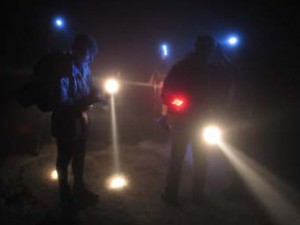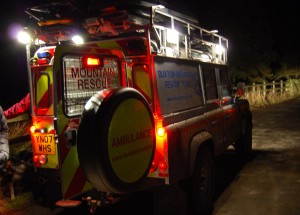Clocks change – a timely reminder!
 At 02.00 hours on Sunday 25th October British Summer Time ends and the clocks go back one hour.
At 02.00 hours on Sunday 25th October British Summer Time ends and the clocks go back one hour.
Over the last few years there has been an increasing trend for rescue team call-outs to suddenly rise in October and November as the short daylight hours catch people out on the hills. On Sunday the sun will set at 16.46 hours which will probably catch some people still up on the moors and unprepared as darkness falls. With the proliferation of mobile phones it is too easy to rely on summoning assistance from mountain rescue teams when simple preparations could have avoided the situation.
All it needs is a little sensible planning. Check your route and have a realistic time schedule remembering that wind and weather, not to mention the Peak District’s famous boggy peat, can really slow you down. However good your guide book is, it will never have a map to compare with Ordnance Survey maps, so be sure to have the right one with you. And take a compass, with the knowledge and experience to use it.
Some form of torch or headlamp is an absolute essential at this time of year both to see with, and to be seen by. Modern LED lamps are very lightweight and reasonably cheap to buy. But, like all torches they are useless with flat batteries – take extra! Talking of batteries, if you use a GPS be sure to have spare batteries with you – and when did you last charge your mobile phone?
If you are caught out on the moor later than expected then start to pay even more attention to your navigation than before. Regularly plot your exact position and progress before darkness hides all the features you would normally use to get a bearing from.
If necessary, cut your route short and start to descend on a recognisable footpath – in darkness never follow a river down as they tend to end up in waterfalls and steep rocks. If you have left details of your intended route with someone before you set off, give them a call and tell them of your change of plan without raising unnecessary alarm. Don’t forget to call them again when you are safely off the hill.
Mountain rescue teams will always turn out when really necessary, but some simple planning can save an awful lot of wasted time and embarrassment. To call out Mountain Rescue dial 999 and ask for the police. Having called for assistance stay still and be sure to maintain a cell-phone signal. Someone from a rescue team will call you back and offer advice and, if necessary, will initiate a call-out of team members and search dogs. It can take an hour or more for teams to assemble and start searching a moor so that extra clothing you know you should be carrying will suddenly become very  useful. Stay calm and stay still, it’s far more difficult to find a moving target than someone who has reported that they are sheltering by a wall. When you see or hear team members approaching help them by showing lights and blowing that whistle that you also know you should have with you. You may hear a helicopter looking for you – try to illuminate your position but never be tempted to shine a strong torch directly at it. The pilots will be using night-vision goggles and can be temporarily blinded by a strong light.
useful. Stay calm and stay still, it’s far more difficult to find a moving target than someone who has reported that they are sheltering by a wall. When you see or hear team members approaching help them by showing lights and blowing that whistle that you also know you should have with you. You may hear a helicopter looking for you – try to illuminate your position but never be tempted to shine a strong torch directly at it. The pilots will be using night-vision goggles and can be temporarily blinded by a strong light.
The hills and dales are there to be enjoyed and can be safely navigated even in bad weather and darkness. It just needs careful planning, good equipment, common sense and some previous experience. If you are short of one of these elements be prepared to get cold and frightened!